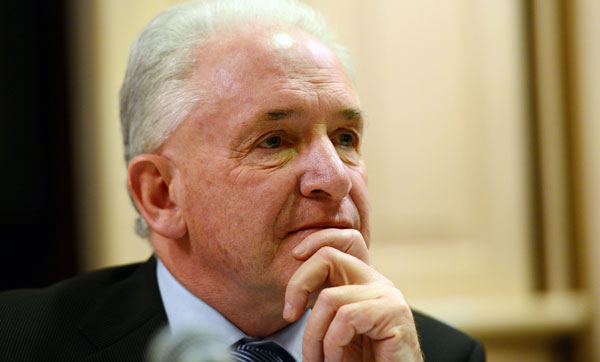
By Sarah Mac Donald - 03 April, 2014
 Censured Redemptorist, Fr Tony Flannery, has suggested that Pope Francis may be “far more radical than John XXIII”.
Censured Redemptorist, Fr Tony Flannery, has suggested that Pope Francis may be “far more radical than John XXIII”.
Speaking ahead of a talk he gave in Dublin on Wednesday evening, Fr Flannery said that based on some of the “quite extraordinary” statements made by the Pontiff in Evangelii Gaudium, “in terms of his thinking – he is very radical.”
“He is calling on us to stand at the crossroads and welcome the outcast. What we are seeing at the moment is a major repositioning of the Church both internally and in its relationship to the world.”
“The question is – can Francis pull that off? Can he achieve any or all of this? It is an enormous question for a 77-year-old man.”
The 67-year-old Co Galway-based priest said some of the things said by the Pope in Evangelii Gaudium are quite extraordinary.
He cited the Pontiff’s statement that spreading of the Gospel is an essential part of being a follower of Christ, but it must be presented not as an imposition but as a source of joy.
“That is an extraordinarily radical statement I think. If somebody had told us that 50 years ago it would have changed our whole perception of religion,” he said.
“In terms of radical thinking and in terms of a serious redesigning of the church – this is powerful stuff,” Fr Flannery told CatholicIreland.net
He also referred to Pope Francis’ assertion that the Church has to accept the unruly freedom of the word, describing it as “a great sentence!”
“If you think of that in terms of the Vatican and the way they responded to me, the last thing they want is unruly freedom or something that they cannot control.”
He also cited the Pontiff’s argument that “different currents of thought and philosophy, theology and personal practice can enable the church to grow since all of them help to express more clearly the immense riches of God’s word. For those who long for a monolithic body of doctrine guarded by all and leaving no room for nuance, this might appear as undesirable and leading to confusion.”
“That is exactly the attitude that I ran into when I tried to deal with the Congregation for the Doctrine of the Faith. A monolithic body of doctrine leaving no room for nuance.”
“And the precise accusation that they made against me was I was confusing the faithful,” Fr Flannery recalled of his 2012 censure by the Vatican.
In his talk, which he has been giving to groups of lay Catholics around the country, he identifies some of the “serious problems in the Church” as the over centralisation of power in the papacy, clericalism and the Church’s attitude to sexuality and women.
Fr Flannery, whose book ‘A Question of Conscience’ was a best seller last year, also argues that the tragedy of the Reformation was caused by the failure of the Church authorities in the 16th century to dialogue with reformers.
Had the Church been able to dialogue with Martin Luther and others, “It could have changed the whole course of history. Hundreds of years of religious wars might not have happened,” he said.
The failure to dialogue with reformers was a “massive mistake” he said and added that as a result, the Reformation came about and the Church turned in on itself for about 300 years and identified itself by what it was against rather than what it was for, he claimed.
The writer and author said part of the problem ahead of the Reformation was that the Church had become so centralised and so authoritarian that it had lost the ability to listen and displayed “the arrogance of power”.
He said he believed this was again a problem for the Church and that is why the Church is in need of reform today.
“If there had been a Francis figure at the time of the Reformation maybe it would have been different …”, he speculated.